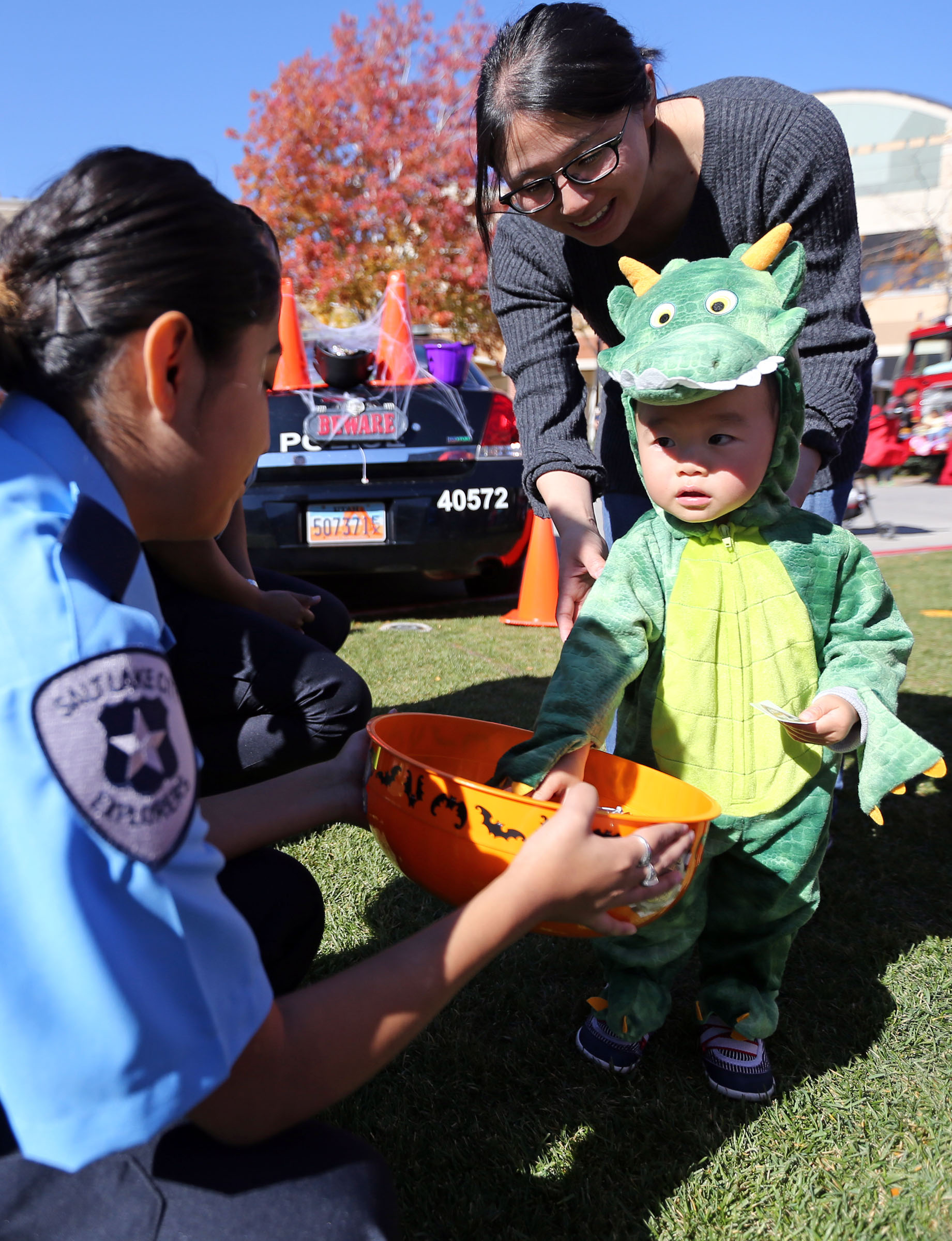Like most families, Amy Brown, her husband and three kids will spend Oct. 31 eating sweets and catching up with friends.
“When it gets dark, we play flashlight tag and the kids go wild. Most of the adults participated last year and everyone got great exercise,” Brown said.
Unlike most families, they’ll also perform a play about Martin Luther, remembering how the former Catholic monk led a rebellion that launched Protestantism 500 years ago.
“The children will reenact” Luther nailing his 95 theses to a church door, and then “we’ll sing some songs about it,” Brown said.
The West Jordan, Utah, family replaced Halloween fun with Reformation Day rituals a few years ago, taking advantage of the shared date. They rejected the spooky holiday’s association with evil spirits, joining around 1 in 5 U.S. adults who do the same.
Religion often drives discomfort with Halloween, which grew out of pagan traditions, said Regina Hansen, who researches religious history and the supernatural. Many mosques, orthodox Jewish synagogues and conservative Christian churches discourage members from embracing tricks and treats.
A person in the news recently who doesn’t celebrate Halloween for religious reasons is Jack Phillips, the Christian baker at the center of an upcoming Supreme Court case over whether business owners can refuse to provide services for same-sex weddings for religious reasons. Phillips also doesn’t design cakes for Halloween because of his beliefs, according to an argument summary from his law firm, Alliance Defending Freedom.
Turning away from costumes and candy can be an isolating experience, especially because few people understand potential religious concerns. Brown and other parents said they’ve faced guilt trips and tough questions, sometimes from their own children.
But deep faith often requires saying no to what everyone else is doing, so working through Halloween-related conflict as a family can be good practice for bigger issues, said Saadia Faruqi, a Muslim author, interfaith activist and mother of two whose family doesn’t celebrate Halloween.
“I’m not going to be with (my kids) as they grow older. They will have to stand up for a lot more things that are more serious than Halloween,” she said.
Halloween and religion
Many people view Halloween as a harmless celebration, appreciating the chance to dress up and eat too much candy. Brown did as well, for most of her life, hosting large parties for her family and friends.
“I used to celebrate Halloween very flamboyantly,” she said.
That changed when Brown, a member of The Church of Jesus Christ of Latter-day Saints, watched young kids walk through a “spook alley” at a church Halloween party. She was struck by how wrong it felt to rejoice in old superstitions.
“I woke up to how much we were desensitizing our children to think that evil is fun,” Brown said.
She set out to learn more about Halloween with her kids, growing more and more uncomfortable as they read about harmful pranks and pagan ceremonies.
Halloween is rooted in an early Celtic feast called Samhain, which welcomed the coming winter, said Hansen, a master lecturer of rhetoric at Boston University.
“It was a harvest festival and a New Year’s festival that … took place at the turn of the year when the cold, dark months were coming,” she said.
Celts believed that ghosts and spirits could enter the real world on this day, creating chaos as they roamed the streets. Some people would stay home and leave out food for the spirits, while others took advantage of superstitions and caused mayhem.
When Catholicism arrived on the British Isles, church leaders chose to incorporate pagan beliefs related to Oct. 31 rather than reject them all together, Hansen said.
The date became an official precursor to All Saints Day on Nov. 1 and All Souls Day on Nov. 2, Catholic holidays dedicated to celebrating all saints of the church and deceased loved ones, respectively. Oct. 31 was rebranded as All Saints’ Eve or All Hallows’ Eve, gradually morphing into what we know today as Halloween.
“It was a night for mischief. People would go around begging for food or playing tricks because that’s what the souls of the dead would do,” Hansen said.
Although it’s been centuries since Oct. 31 was purely a pagan holiday, many people of faith still struggle to embrace Halloween, according to a 2015 survey from LifeWay Research.
“Those attending a religious service once a week or more are the least likely to say Halloween is all in good fun (44 percent), compared to those attending once or twice a month (68 percent) or only on religious holidays (82 percent),” the survey reported.
Believers may be urged by their religious leaders not to celebrate or decide on their own that Halloween isn’t for them, as the Browns did, Hansen said. The LDS Church, which does have guidelines on activities within its church buildings that would apply to Halloween, has no specific teaching or policy against celebrating the holiday.
Faruqi said that none of her Muslim friends take part in Halloween, noting that her Houston mosque’s leaders usually address why it’s unholy at some point in October.
“It’s a pagan and devil-worshipping holiday, which is the antithesis of our own religious beliefs,” she said.
Creating new traditions
Faruqi used to feel like a mean mom for rejecting Halloween, writing in 2014 about her daughter begging to be a princess for the day.
“I hate being the bad guy,” she wrote.
However, as her kids get older, she’s recognized the value of holding her ground, because Islam requires personal sacrifices throughout life, like eating a special diet and avoiding alcohol.
“I never tell my kids to do things for no reason. I sit and explain to them why,” Faruqi said.
Like Brown, she’s talked with her kids about Halloween’s history, suggesting other ways for the family to have fun.
“We go around at Christmas and Halloween in several neighborhoods to look at decorations. They can be part of it in that way, and they enjoy that,” Faruqi said.
Many congregations and families worried about the holiday’s dark side find a way to acknowledge Halloween in their own way. Faruqi and her kids admire festive displays, the Browns celebrate Reformation Day and the First Southern Baptist Church in Topeka, Kansas, hosts a “Folloween Jesus” event, where members hand out candy and tell people about church activities.
“This is a community outreach opportunity for us,” said Donna Doel, FSBC’s children’s ministry director. “We want to provide a safe place for families to come and celebrate however they want.”
Adjusting Halloween traditions to address religious concerns doesn’t always require rejecting the holiday. Kirsten McKeown and her family began celebrating it again last year after brainstorming how to enjoy the good parts without highlighting the evil aspects.
“The more I thought about it, the more I worried about missing an opportunity to interact with our neighbors and introduce ourselves,” said McKeown, a nondenominational Christian in St. Louis, Missouri. “On what other day is it socially acceptable to go knock on other people’s doors?”
They stick to simple costumes and refrain from putting up skeletons or other spooky decorations. They focus on making new connections, rather than warding off spirits or causing mischief.
“One of the moms I met last year (on Halloween) came over a couple weeks ago with her daughters to play,” McKeown said.
For centuries, Halloween has represented many things to many people, encompassing ancient rituals, Catholic traditions, capitalistic opportunities and secular parties, Hansen said. It actually suits the holiday’s history for religious families to create their own ways to mark Oct. 31.
Halloween “is whatever you want it to be,” she said.
Email: kdallas@deseretnews.com Twitter: @kelsey_dallas
![]()
1 COMMENTS
Comments are closed.






The Halloween story is for the birds…to put it nicely. There is enough crap to have to listen to and watch in Utah news, then this appears. Many more things of interest for regular, normal, people in society to watch. Tell a story about young men and women from Star Valley that are in the Military for instance. That would be of interest to many. And good luck finding any, they are all on Missions. Sorry you media people are annoying.